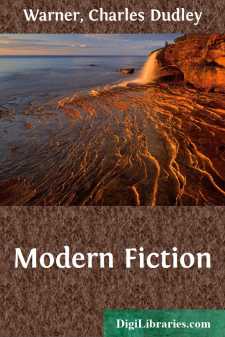Categories
- Antiques & Collectibles 13
- Architecture 36
- Art 48
- Bibles 22
- Biography & Autobiography 813
- Body, Mind & Spirit 142
- Business & Economics 28
- Children's Books 17
- Children's Fiction 14
- Computers 4
- Cooking 94
- Crafts & Hobbies 4
- Drama 346
- Education 46
- Family & Relationships 57
- Fiction 11829
- Games 19
- Gardening 17
- Health & Fitness 34
- History 1377
- House & Home 1
- Humor 147
- Juvenile Fiction 1873
- Juvenile Nonfiction 202
- Language Arts & Disciplines 88
- Law 16
- Literary Collections 686
- Literary Criticism 179
- Mathematics 13
- Medical 41
- Music 40
- Nature 179
- Non-Classifiable 1768
- Performing Arts 7
- Periodicals 1453
- Philosophy 64
- Photography 2
- Poetry 896
- Political Science 203
- Psychology 42
- Reference 154
- Religion 513
- Science 126
- Self-Help 84
- Social Science 81
- Sports & Recreation 34
- Study Aids 3
- Technology & Engineering 59
- Transportation 23
- Travel 463
- True Crime 29
Charles Dudley Warner
Charles Dudley Warner (1829-1900) was an American essayist, novelist, and editor, best known for his collaboration with Mark Twain on the novel "The Gilded Age: A Tale of Today." He was also a respected literary critic and travel writer, contributing to publications such as Harper's Magazine. Warner's work often reflected his keen observations on society and culture, and he was recognized for his wit and eloquence.
Author's Books:
Sort by:
INTRODUCTION Thirty years ago and more those who read and valued good books in this country made the acquaintance of Mr. Warner, and since the publication of "My Summer In a Garden" no work of his has needed any other introduction than the presence of his name on the title-page; and now that reputation has mellowed into memory, even the word of interpretation seems superfluous. Mr. Warner wrote...
more...
This December evening, the imagination, by a law of contrast, recalls another December night two hundred and seventy years ago. The circle of darkness is drawn about a little group of Pilgrims who have come ashore on a sandy and inhospitable coast. On one side is a vexed and wintry sea, three thousand miles of tossing waves and tempest, beyond which lie the home, the hedgerows and cottages, the church...
more...
I. PRELIMINARY. It is over twenty years since the death of Washington Irving removed that personal presence which is always a powerful, and sometimes the sole, stimulus to the sale of an author's books, and which strongly affects the contemporary judgment of their merits. It is nearly a century since his birth, which was almost coeval with that of the Republic, for it took place the year the...
more...
England has played a part in modern history altogether out of proportion to its size. The whole of Great Britain, including Ireland, has only eleven thousand more square miles than Italy; and England and Wales alone are not half so large as Italy. England alone is about the size of North Carolina. It is, as Franklin, in 1763, wrote to Mary Stevenson in London, "that petty island which, compared to...
more...
The simple story of the life of Pocahontas is sufficiently romantic without the embellishments which have been wrought on it either by the vanity of Captain Smith or the natural pride of the descendants of this dusky princess who have been ennobled by the smallest rivulet of her red blood. That she was a child of remarkable intelligence, and that she early showed a tender regard for the whites and...
more...
I. HOW I KILLED A BEAR So many conflicting accounts have appeared about my casual encounter with an Adirondack bear last summer that in justice to the public, to myself, and to the bear, it is necessary to make a plain statement of the facts. Besides, it is so seldom I have occasion to kill a bear, that the celebration of the exploit may be excused. The encounter was unpremeditated on both sides. I was...
more...
Queen Elizabeth being dead about ten o'clock in the morning, March 24, 1603, Sir Robert Cary posted away, unsent, to King James of Scotland to inform him of the "accident," and got made a baron of the realm for his ride. On his way down to take possession of his new kingdom the king distributed the honor of knighthood right and left liberally; at Theobald's he created eight-and-twenty...
more...
FIRST STUDY The fire on the hearth has almost gone out in New England; the hearth has gone out; the family has lost its center; age ceases to be respected; sex is only distinguished by a difference between millinery bills and tailors' bills; there is no more toast-and-cider; the young are not allowed to eat mince-pies at ten o'clock at night; half a cheese is no longer set to toast before the...
more...
I. BEING A BOY One of the best things in the world to be is a boy; it requires no experience, though it needs some practice to be a good one. The disadvantage of the position is that it does not last long enough; it is soon over; just as you get used to being a boy, you have to be something else, with a good deal more work to do and not half so much fun. And yet every boy is anxious to be a man, and is...
more...
One of the worst characteristics of modern fiction is its so-called truth to nature. For fiction is an art, as painting is, as sculpture is, as acting is. A photograph of a natural object is not art; nor is the plaster cast of a man's face, nor is the bare setting on the stage of an actual occurrence. Art requires an idealization of nature. The amateur, though she may be a lady, who attempts to...
more...











